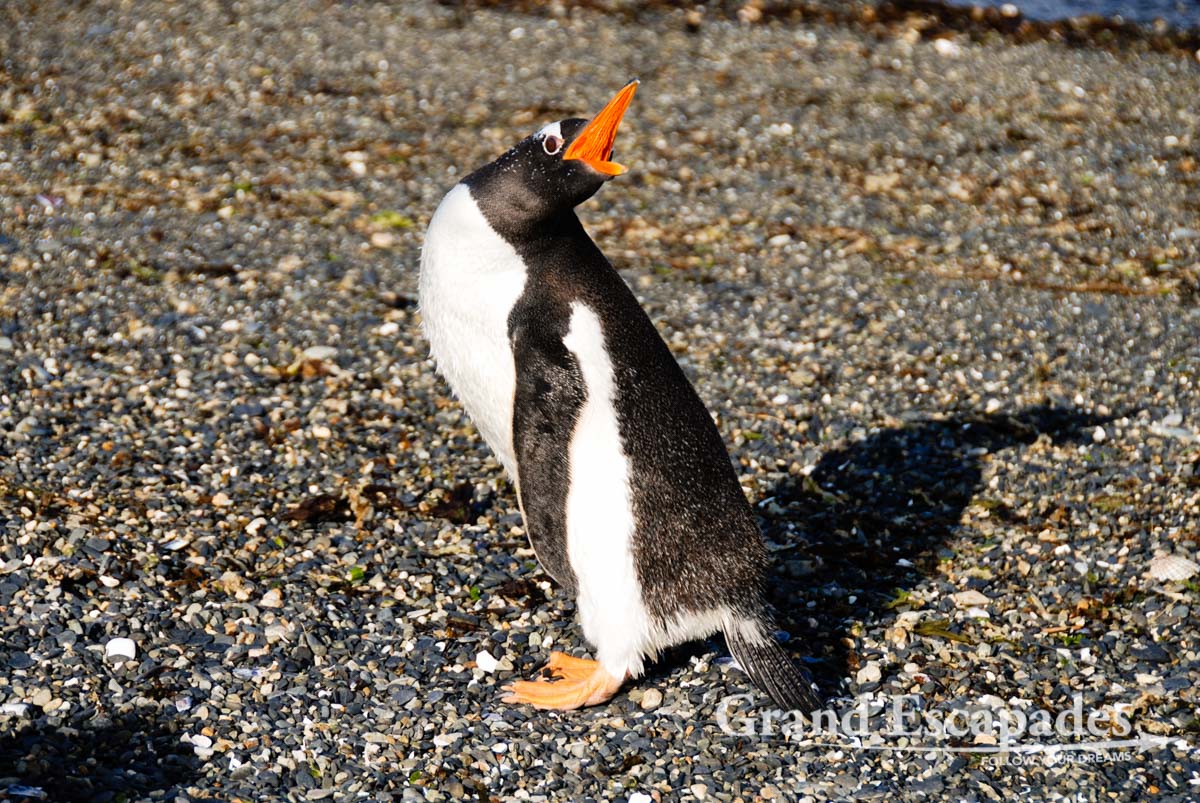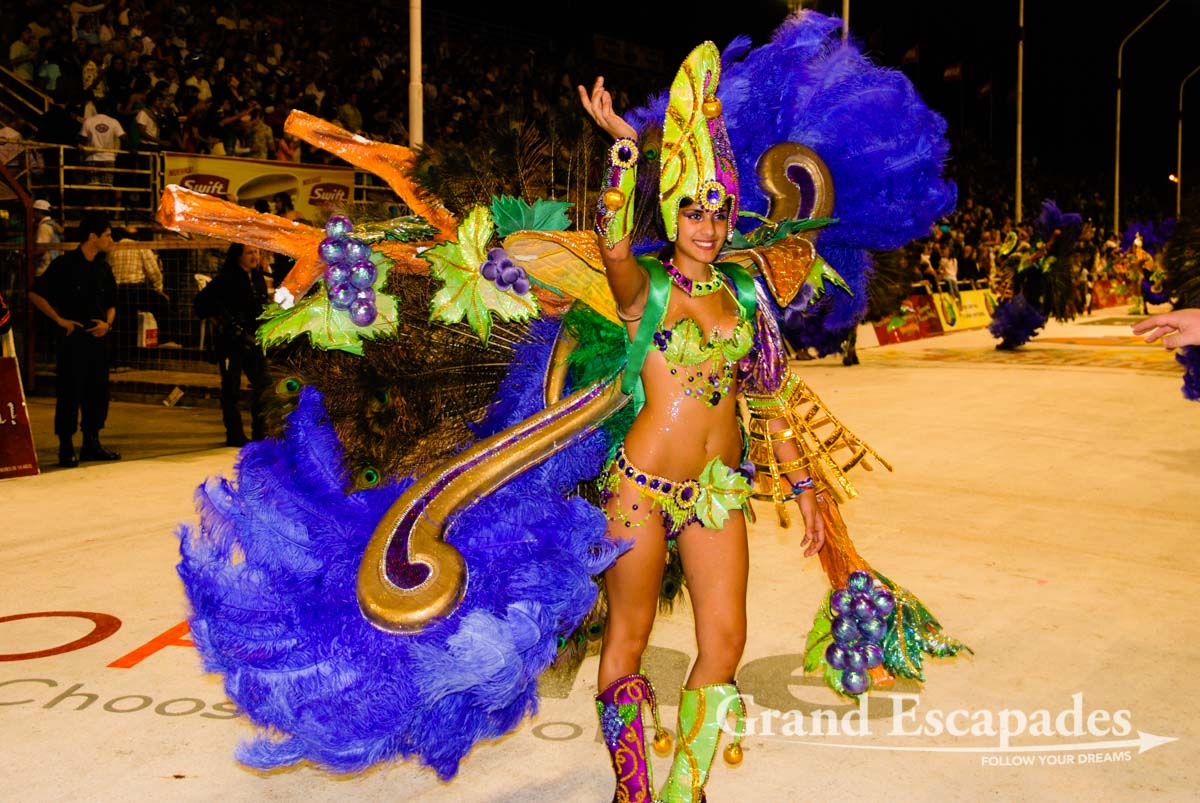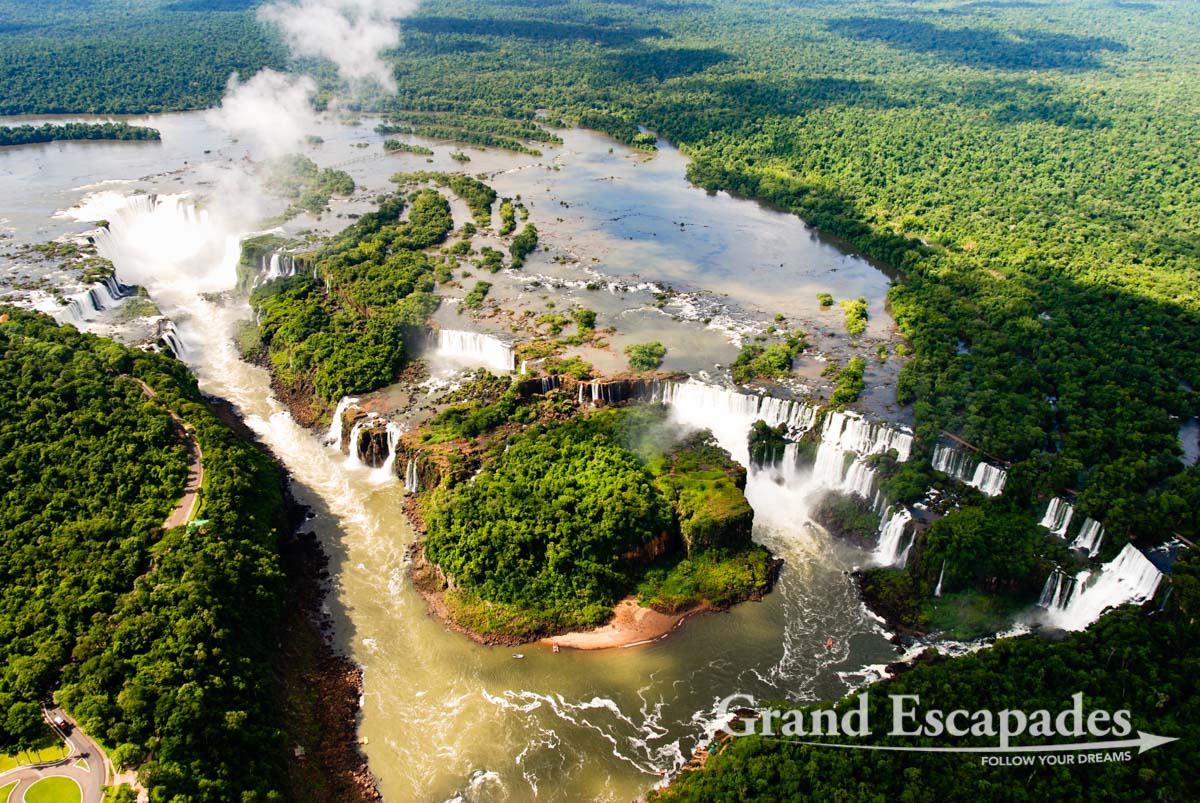
There are also about 50 couples of adult Gentoo Penguins, which are much bigger, about 70 centimeters high, with orange feet and beaks.
– Gentoo Penguin (Pygoscelis papua), Tierra del Fuego (Fireland), near Ushuaia, South Patagonia, Argentina, South America
Yes, we have already seen lots of penguins in Peninsula Valdez and especially in Punta Tombo. But frankly: who can resist visiting a penguin colony if there is another opportunity to see such cute creatures? Especially since this time the whole family went to see this spectacle!
We had booked a tour with Para Tour, the only agency who is allowed to take tourists ON the very island where the penguins come in September to build nests, lay their eggs and breed, until they set out for the ocean in March, where the spend the winter. The tour was quite pricey, 210 Pesos or approx. 50 Euros, but it is definitely worth it! To watch the penguins so close and the nice scenery was a fabulous experience, which was only topped by our guide, who was very funny, extremely knowledgeable and spent a good time answering Anna’s and Helene’s questions.

Magellanic Penguins (Spheniscus magellanicus), Tierra del Fuego (Fireland), near Ushuaia, South Patagonia, Argentina, South America

Magellanic Penguins (Spheniscus magellanicus), Tierra del Fuego (Fireland), near Ushuaia, South Patagonia, Argentina, South America

Juvenile penguins – Magellanic Penguins (Spheniscus magellanicus), Tierra del Fuego (Fireland), near Ushuaia, South Patagonia, Argentina, South America
The penguin colony is much smaller than the one in Punta Tombo near Peninsula Valdez but very different. There are far less penguins here but the scenery is so nice, not the monotonous steppe so typical for Patagonia. There are 2.000 couples of adult Magellan Penguins and also about 50 couples of adult Gentoo Penguins, which are much bigger, about 70 centimeters high, with orange feet and beaks. The really interesting part for us this time was to listen to the explanations of our guide about the penguins and their breeding habits, since it was the breeding season.

Gentoo Penguin (Pygoscelis papua), Tierra del Fuego (Fireland), near Ushuaia, South Patagonia, Argentina, South America

Gentoo Penguin (Pygoscelis papua), Tierra del Fuego (Fireland), near Ushuaia, South Patagonia, Argentina, South America

Magellanic Penguins (Spheniscus magellanicus), Tierra del Fuego (Fireland), near Ushuaia, South Patagonia, Argentina, South America.
During the bus ride going to the island, our guide told us that beavers from Canada were introduced to the area in the 1950s. But when their fur turned out to be unsuitable for making coats, they were set free. Since they face no predators in Patagonia, unlike in Canada, 50.000 beavers are now roaming the woods, gnawing down trees and building huge dams which naturally lead to flooding the area. This is their way to create a sheltered environment, since they build their “home” in the middle of these artificially created lakes.

The penguin colony is much smaller than the one in Punta Tombo near Peninsula Valdez but very different. There are far less penguins here but the scenery is so nice, not the monotonous steppe so typical for Patagonia – Tierra del Fuego (Fireland), near Ushuaia, South Patagonia, Argentina, South America

50.000 beavers are now roaming the woods, gnawing down trees and building huge dams which naturally lead to flooding the area. This is their way to create a sheltered environment, since they build their “home” in the middle of these artificially created lakes, Tierra del Fuego (Fireland), near Ushuaia, South Patagonia, Argentina, South America
Well, the problem is that all trees in this area drown and thus the huge beaver population has become a real environmental problem that does not seem easy to solve. The problem is now so big that the government offers no less than 60 Pesos or about 20 USD for each beaver tail brought by hunters. But unfortunately they are very difficult to hunt, so the population does not decrease. So on the way back to Ushuaia we stopped at such a beaver dam and only then could we understand the real dimensions of the problem.

Trees are shaped by the permanent and strong winds, Tierra del Fuego (Fireland), near Ushuaia, South Patagonia, Argentina, South America

Trees are shaped by the permanent and strong winds, Tierra del Fuego (Fireland), near Ushuaia, South Patagonia, Argentina, South America

Trees are shaped by the permanent and strong winds, Tierra del Fuego (Fireland), near Ushuaia, South Patagonia, Argentina, South America.
Another excursion took us up to Glacial Martial, which is not much of a glacier but the ride on the chair lift and the view of Ushuaia and the Beagle Channel is great.
On our last day, Gilles, Guy, Joel and Heidi went by car to Parque National Tierra del Fuego. There we hiked for three hours along the shores of the Beagle Channel, which is very scenic, with lots of small bays, crystal clear water, trees shaped by the permanent wind and lots of beautiful flowers. The rest of the family went with the kids to a small farm near Ushuaia, which is home of about 50 huskies.







